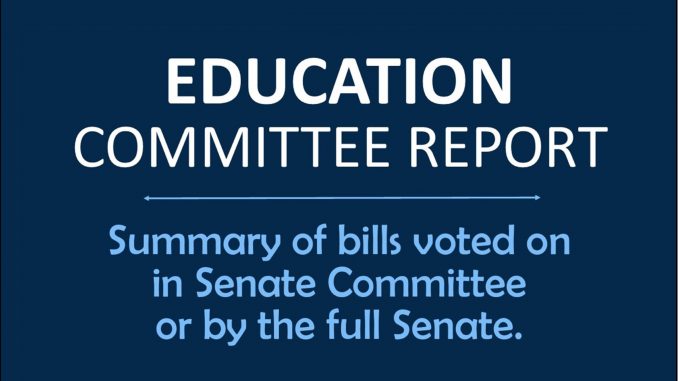
On this page
COMMITTEE ACTION:
SSB 3096 – SSA/Categorical School Funding
SSB
3096 is the state supplemental aid and categorical funding for FY21 bill at
2.1%, which is $91 million. The Republicans have announced their plan to cut
the AEAs by an additional $15 million in the Standings bill, which would mean
their 2.1 percent SSA will end up spending $76 million for basic school aid.
This bill will result in $7,024 per pupil funding or an increase of $144 over
last year.
[2/4: 8-5, party-line (Excused: Behn, Zaun)]
SSB 3097 – Equity Bill: Per Pupil and Transportation
SSB 3097 addresses the school aid state cost per pupil (SCPP) versus the district cost per pupil (DCPP) and transportation equity.
The per pupil equity provides an additional $10 per student for some school districts on top of the state supplemental aid for the upcoming budget year. *Same as House GOP*
The transportation equity portion of the bill provides an additional $7.3 million to the Transportation Equity Fund for a total of $26 million in FY 21. This effort builds upon last year’s $19 million investment. *Different than House GOP*
- SSB 3097 gets all schools to the statewide transportation per pupil average.
- SSB 3097 has language that says transportation funding will grow by the Categorical SSA percentage starting in FY21. This means an additional $400,000 will be generated through the school aid formula and the cost for FY21 SSA will increase by that $400,000. *This is different than the House GOP*
[2/4: 13-0 (Excused: Behn, Zaun)]
SSB 3080 – Classroom Management and Therapeutic Classrooms
SSB 3080 relates to classroom management by providing for development and distribution of guidelines and prohibiting implementation of what is commonly referred to as a classroom clear in a student’s IEP. The bill appropriates $500,000 to the Department of Education from the general fund for FY20-21 for such purposes.
The bill limits the regular inclusion of clearing classroom from IEPs, in accordance with federal and state laws, but does allow a classroom teacher to clear students from a classroom if a student’s behavior presents an immediate danger to the health or safety of those in the classroom. If a teacher clears a classroom in such a situation, the school district must notify the parents of all students assigned to the classroom. The principal must request that the parent or guardian of the student whose behavior caused the classroom clearance meet with school officials.
The bill also adds to exemptions relating to corporal punishment of a student, provides circumstances under which a school employee must be granted immunity from civil and criminal liability, and immunity from disciplinary action by the employer, which results from reasonable physical contact with a student. It requires the submission of reports of alleged violence or assaults by students.
The bill establishes a therapeutic classroom incentive grant program and funds it at $1.5 million at the Department of Education to provide competitive grants to school districts. A school district may collaborate with others to apply for a grant to establish a therapeutic classroom. The department is directed to develop a grant application and selection and evaluation criteria, and to give priority to grant applications submitted by school districts located in regions providing children’s behavioral health services, with highest priority to those proposing to serve the most students. It provides for $500,000 for the transportation of students to therapeutic classrooms through a similar reimbursement process to that used for nonpublic school transportation, and allows this fund to carry forward.
An amendment that addressed many concerns in the bill was
passed in committee and supported by Democratic senators.
[2/5: 8-5, party-line (Excused: Behn, Zaun)]
SSB 3067 – Health Screening Notifications
SSB
3067 prohibits school districts from administering or conducting student
health screenings that are not required by state or federal law, unless the
school district has first acquired the written consent of the students’ parent
or guardian. The committee adopted an amendment that defines health screening,
addresses emergency care situations, clarifies that the bill does not include
abuse screenings or incidents that need to be covered by mandatory reporters, and
only applies to those students with a legal guardian or parent who enrolls them
in school.
[2/4: 13-0 (Excused: Behn, Zaun)]
SSB 3019 – Qualifications for community college CTE instructors
SSB 3019 gives another option by which a community college instructor may teach in the career and technical education (CTE) area. The bill now allows someone with an associate degree in the relevant CTE field, if such degree is considered terminal for that field of instruction, and the instructor has at least 3,000 hours of recent and relevant work experience to teach CTE classes in their area. Currently, an instructor must have a baccalaureate or graduate degree, OR if less than a BA, they must have special training and at least 6,000 hours of recent and relevant work experience in the area in which the instructor teaches classes.
The committee adopted an amendment that would allow anyone with any 4-year
degree and 18 semester hours of the relevant CTE classroom work to be eligible
to teach those CTE classes.
[2/4: 13-0 (Excused: Behn, Zaun)]
SF 2065 – Increasing ISL levy to support school resource officers
SF 2065 authorizes school districts to raise additional amounts of property tax or income surtax under the instructional support program for certain school resource officer expenses. If a school has maxed out their ISL levy (which most have), the additional amount of funding allowed under this bill must only be spent on a school resource officer and only for school budget years beginning on or after July 1, 2021.
The committee adopted an amendment requiring a
school board to pass a resolution specifying the additional amount to be
levied.
[2/4: 13-0 (Excused: Behn, Zaun)]
